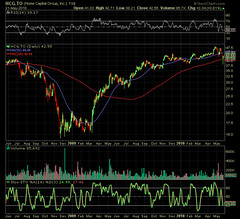Over the course of the next few weeks we are going to be highlighting some of the stocks on our watch list. We’ve had approximately 60% of our portfolio in cash for the better part of 3 years and are finally looking to step back into the equity markets again. We’ve tried to diversify our watch list to cover a wide range of sectors and industries but there is a limit to the number of companies we can follow. So, if we’ve missed out on a company that you own, feel free to let us know in the comments below or better yet, write up a note on why you like said company (its prospects, valuations etc.) and send it to us. Should the note hold up to a minor bit of scrutiny, we shall publish it for everyone to see, learn and hopefully make some make money.
You might say that this is a bad time to get into equities. That is certainly a possibility. Being very cognizant of this, we tried to find outstanding companies in sectors/industries that we are optimistic on for the future. Keep in mind that we do not own these stocks as of yet but would like to at the right price. We are not of the opinion that markets are headed higher in the short term, so we shall take our time, be patient and let prices come to us. In this sense, limit orders shall be our ally. In addition, nearly all the companies we are going to write about pay a dividend, even if it is a minute one. We figure that we might as well get paid to wait should the markets drift sideways or downward through the summer.
As always we welcome your comments, suggestions, queries and support. Enjoy!
Home Capital Group [HCG:TSX]
Fundamentals
| Basic Market Cap (mm) | $1,608 |
| Basic Shares O/S (mm) | 34.7 |
| Fully Diluted O/S (mm) | 35.7 |
| Dividend | $0.16, quarterly |
| 52-Week Range | $27.58 - $48.54 |
Led by President and CEO, Gerald M. Soloway, “Home Capital Group Inc. is a holding Company that operates through its principal subsidiary, Home Trust Company. Home Trust is a federally regulated trust company offering deposit; mortgage lending, retail credit and credit card issuing services across Canada.”
In short, the company specializes in non-prime residential mortgages. Non-prime being defined as customers that are self-employed, have a limited credit history, or impairments in credit history. Home Capital’s asset growth is financed primarily through retail deposit-taking.
| 2008 | 2009 | 2010E | |
| Diluted EPS | $3.13 | $4.15 | $4.97 |
| Price to Earnings | 14.8x | 11.2x | 8.56x |
| ROE | 28% | 28% | 26% |
| Price to Book Value | 3.8x | 2.8x | 2.35x (Book Value = $18.08 as of March 31,2010) |
At March 31, 2010 the composition of the total mortgage portfolio was 85.8% residential and 14.2% non-residential, compared to a composition of 86.0% residential and 14.0% non-residential at December 31, 2009 and a composition of 80.1% residential and 19.9% non-residential one year ago. At March 31, 2010 the average loan to value on origination of the Company’s residential mortgage loans portfolio was 71.0%, compared to 68.8% at December 31, 2009 and 69.9 % one year ago. Loan to value is one of the key risk factors that lenders assess when qualifying borrowers for a mortgage. Low loan to value (below 80%) significantly reduce homeowner incentive to walk away from an obligation thereby reducing the risk of loss to HCG on foreclosure.
When initiating coverage on Home Capital Group, Jennings Capital analyst Marc Charbin noted:
“May 18, 2007 By tracking impairment rates by loan type (where the data was publicly available), we have found that domestic and personal loans have had impairment rate multiples below those of international and commercial loans. These trends are especially clear in the early 1990s, Canada’s last official recession. We believe that investors who continue to maintain exposure to financial stocks should consider the nature of the assets they are purchasing, applying a higher weighting to those stocks with high residential mortgage loan concentration.”
For the first quarter of 2010, Home Capital Group reported net income of $41.7 million, an increase of 32.8% over the $31.4 million recorded in the same period last year driven by strong growth in net interest income. The company also reported diluted EPS of $1.20 versus the consensus estimate of $1.13. This equates to a 31.9% increase from the diluted earnings of $0.91 reported in Q1/09. For a little perspective, despite the stock price dropping below the $20 level in late 2008 and early 2009, earnings have now increased on a sequential basis for the last 16 quarters.
For the first quarter of 2010, gross impaired loans inched slightly higher to a rate of 0.96% from 0.89% last quarter, compared to 1.38% for the “Big 6” banks. The company reported that provisions for credit losses decreased to $1.0 million compared to $3.3 million in Q1/09 and $2.3 million in Q4/09 due to a decline in expected write-offs in impaired loans and improved recoveries.
As of March 31, 2010, Tier 1 and Total Capital ratios remained strong at 16.5% and 17.9%, respectively, compared to 16.4% and 18% as of December 31, 2009 and 13.8% and 15.2% one year ago.
Despite net interest margins remaining compressed below 3.0% since fiscal 2008 (currently at the 2.7% level), management did mention that they are observing improvements in the first quarter of 2010 and have thus begun reducing excess liquidity from the balance sheet. As the company deploys its excess liquidity, its loan book should increase and as interest rates rise, so should the company’s margins.
At March 31, 2010 liquid assets amounted to $794.3 million, compared to $1.2 billion recorded at December 31, 2009 and $610.7 million at March 31, 2009. The decline in overall liquidity levels from the fourth quarter is a result of higher liquidity levels at December 31, 2009 due to the timing of securitization activities. Home Capital expects to maintain a minimum 20% of 100-day obligations in liquid assets. For the twelve months ended March 31, 2010 the Company maintained a monthly average of $638.6 million or 46.8% of 100-day obligations in liquid assets compared to $646.5 million or 44.8% for the twelve months ended December 31, 2009 and $609.3 million or 45.0% for the twelve months ended March 31, 2009.
With regards to outlook, management noted that:
“… even if there is a modest slowing of the growth rate in housing markets, it is not expected to impact the Company’s ability to achieve its stated objectives for 2010 as the strategies it employs to generate growth and robust returns have been developed with these market expectations in mind. The Company intends to keep focusing on superior customer and broker service, diverse product offerings and expansion of broker networks and market penetration. The stabilization of housing markets has allowed for renewed focus on growth in the Company’s traditional mortgage portfolio, Equityline Visa and geographic diversification strategies. The Company expects volume increases in the traditional portfolio and further geographical diversification of its mortgage portfolio during the year.”
Home Capital Group experienced continued success in its insured Accelerator mortgage program with $561.1 million of residential mortgage originations compared to $199.7 million in the first quarter of 2009 and $483.8 million in the fourth quarter of 2009. Originations in the traditional portfolio were $537.9 million in the quarter, up from $306.5 million in the comparable quarter of 2009 and $517.7 million in the fourth quarter of 2009. Residential originations also include multi-unit residential originations of $134.8 million compared to $168.8 million in the first quarter of 2009 and $296.8 million in the fourth quarter of 2009.
Management also reported that a preliminary analysis suggests that if the income statement for Home Capital’s first quarter of 2010 was presented on an IFRS basis, net income and earnings per share would not be materially impacted. Commenting on this statement, Jennings Capital analyst Marc Charbin wrote the following in a note to clients on May 5, 2010, wherein he increased his 12 month target price for the company to C$65.00 from C$60.00:
“We have consistently advocated that this is part of the reason HCG has traded at a discount to its peers – investors’ increasing confidence with the accounting change should result in valuation multiple expansion.”
Management reported that total shareholders’ equity of $628.0 million at March 31, 2010 increased by $37.7 million or 6.4% over the $590.3 million reported at December 31, 2009. The increase since December 2009 was internally generated from net income over the three months of $41.7 million, less $5.6 million for dividends payable to shareholders. The remaining changes were principally driven from positive movements of $1.1 million in accumulated other comprehensive income, $3.0 million in proceeds from stock options, offset by a $0.7 million buy-back of the Company’s common shares through the normal course issuer bid.
Total shareholders’ equity of $628.0 million at March 31, 2010 rose by $160.0 million, or 34.2% over the $467.9 million reported at March 31, 2009. This growth was internally generated from earnings for the twelve-month period ended March 31, 2010 of $154.8 million, less $22.2 million for shareholder dividends. Additional movements resulted from amortization of the fair value of stock options; reduction of capital stock through the Company’s Normal Course Issuer Bid and changes in accumulated other comprehensive income. At March 31, 2010 the book value per common share was $18.08, compared to $17.00 at December 31, 2009 and $13.62 at March 31, 2009.
Total assets under administration, which included securitized off-balance sheet mortgages, increased 40.4% to $12.04 billion at March 31, 2010 from $8.58 billion at March 31, 2009 and up 4.6% from the $11.51 billion recorded at the end of 2009.
The Case For A $100 Stock In Two Years
Taking once again from a note authored by Jennings Capital analyst Marc Charbin:
“If HCG can maintain its trend of 20%+ EPS growth and valuation multiples expand to previous levels (P/E of 15x), HCG stock could reach north of $100. EPS growth above 20% would be nothing new to HCG – it did it nine times in the last 10 years (as a group, the banks have done it three times).
What if the housing market softens or if competition intensifies? We calculate that HCG only needs to capture an additional 1.0% market share in the next three years to drive 20% earnings growth – a reasonable target, considering HCG is dominant in the alternative lending space and has been very successful with the launch of its Accelerator product (under this program mortgages are fully insured against loss as long as certain underwriting criteria are met). Capturing another 1.0% market share would approximately double the Company’s current assets under management.”
The aforementioned details were an oversimplified snapshot of the details behind Home Capital Group [HCG:TSX]. Due to time and space constraints, there is an immense amount of information that has not been included in this article. Please do your own due diligence and consult with a qualified financial advisor before making any investment decisions.
When to Buy?
| Price | Key Technical Levels (Courtesy: www.barchart.com) |
| $42.55 | Current Price |
| $41.89 | 38.2% Retracement from 4 Week Low 38.2% Retracement from 13 Week Low |
| $39.60 | Pivot Point 1st Level Support |
| $39.52 | 38.2% Retracement from 52 Week High |
| $38.21 | 4 Week Low 13 Week Low |
Given the summer doldrums (which usually entail lower trading volumes) and the volatility and uncertainty gripping global equity markets as a consequence of the sovereign debt crisis in Europe, we are hoping for sub $40 prices to initiate a position in Home Capital Group. Despite our positive inclination towards the company, we are in no hurry to buy the stock and are going to let the price come to us. We currently have a standing good till cancel limit order at a price level that is far below the current price of $42.55. The reason for this is not because we think Home Capital Group is overvalued at these levels but because we think the ensuing months will be characterized by greater than normal volatility thereby providing an opportunity for the stock to fall further before it heads higher. We would also like to mention that we like Home Capital Group as a company and for its management that has always delivered on its word. Given their caliber and track record we trust that management will be able to successfully navigate tough economic times and fare better than most, should Canada dip back into a recession. Follow us on Twitter to find out when and at what price we purchase Home Capital Group [HCG:TSX].









